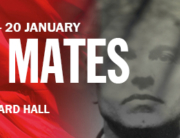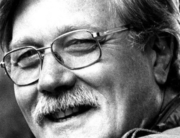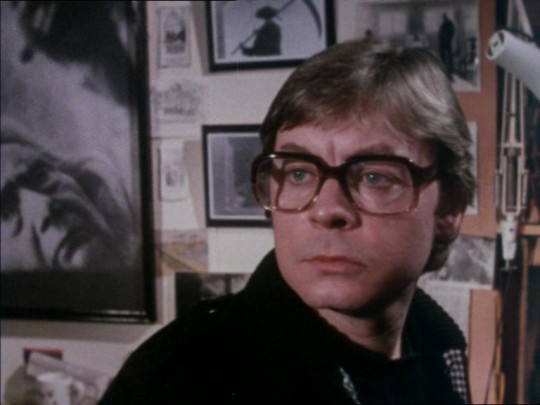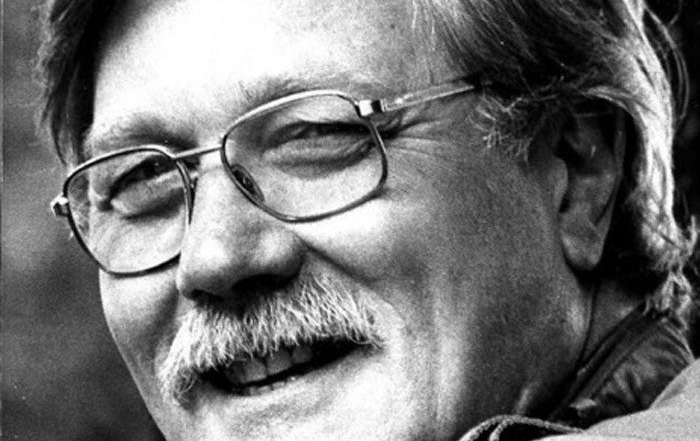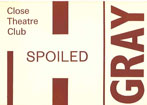The Perils of the Playwright
by Simon Callow
A review of An Unnatural Pursuit and Other Pieces, first printed in The Sunday Times on 1st September 1985.
The review is reprinted in Simon Callow’s book My Life in Pieces, published by Nick Hern Books on 3rd June 2010. For more information visit the Nick Hern Books website. Copied here by kind permission of the author.
Simon Gray is one of those writers whose popular image bears little resemblance to his work. One goes to the theatre expecting a Simon Gray Play, urbane, incestuously bitchy, with a central star-role which knocks everyone else into the ground. Instead one gets extraordinarily complex ensemble pieces full of surreal humour and devastating visions of loneliness, defeat and despair. It is true that the social world and the overall tone of the pieces, with a couple of exceptions, remain the same from play to play, though no more or less than Chekhov – with whom his finest play, Qurtermaine’s Terms, can well stand comparison. In the same manner, and almost equally fine, is his latest play, The Common Pursuit, whose production by Harold Pinter is the subject of the present volume. Or so it would seem. In fact, the lasting impression of An Unnatural Pursuit is of the author himself with a brilliant cameo portrait of Pinter and a number of sharp and savage observations about the businesss of putting on a play thrown in as a bonus.
The bulk of the book is a work-journal, starting with the completion of the play (â??I numbered the pages, packed and shaped them into a completed-looking pile, toasted myself with a further gulp of whisky and a few more cigarettes, gloated. This, for me, is the only moment of pure excitement I ever experienced in the playwriting business; then following its career through the stages of casting, rehearsal, performance, failure to transfer, and closure. It’s a vivid picture of those particular horrors: the sad series of compromises as you decline from your initial bright dream of the play, not being able to get this theatre, that actor, those dates; the mysterious failure of companies to gell, of rhythms to quite take hold; the wilful blindness of certain critics and the regrettable tendency of the public to listen to them; the terrible brevity of the run if the play doesn’t transfer – so much talent and work and passion squandered.
All this is accurately and wittily described. But the book is more remarkable than mere reportage. For one thing, the playwright’s eye-view is a unique and inherently frustrating vantage point: second, the playwright in question is Simon Gray. By the end of the book we come to know him very well.
â??Actually, he’s not nearly such a pain as his self-portrait would have you believe,â? says Pinter in his foreword. No indeed, but pain is nevertheless exactly the word: not that inflicted on others â?? that undergone by himself. The wildly funny accounts he offers of his paranoia, power-mania, anxiety and doubt simply heighten one’s sense of it. Smoking like a beagle, veins throbbing with booze, he pours his nightly cheap xanax online confessions in the tape-recorder, a haunted, haggard, positively Dostoievskian figure. En passant, he offers much lucid analysis of his play and the processes that are leading to it realisation. But at any moment, in the midnight stillness of his study, speculation is liable to run riot: why are his actors behaving like talentless buffoons and/or obstreperous Marxists? Why does Pinter want to exclude only his photograph from the programme?
I do actually feel very passionately that the play was written by me. I am the author, and yet the only people who are going to appear in the programme are the actors and the director, with the author, the only begetter, not visible.
After a restless night, he becomes convinced that one of the actors has acquired a lisp:
I formed a plan to watch Nick Le Prevost’s lips like a hawk, and the moment I saw or heard the lisp, to alert Harold to it. He could take it from there . . . I do think the chap who plays Stuart shouldn’t have a lisp. Or a club-foot or a hunchback. At least without giving me a chance to re-write the text.
This is madness, of course (from which, I hasten to say, he always recovers; that is, he knows he’s mad) but it is the divine madness that makes the author of Butley, Otherwise Engaged and Quartermaine’s Terms an infinitely darker, more passionate, less rational artist than the waspish boulevardier of the critics’?? report.
There are two areas of legitimate interest to which the book doesn’t address itself: the actual writing of the play; and why, given an excellent cast and a masterly director, it didn’t quite work. Mysteries, both, no doubt. What you do get is the lowdown on the playwright’s relation to the production, and a full length soul-sketch of one of the best living practitioners of that art: in the second section of the book, the Gray of the work-journals is supplemented by the even darker Gray of ‘??My Cambridge’, one of the occasional pieces reprinted in the present volume. (The other pieces are the classically hilarious Flops and Other Fragments: an appreciation of Leavis; and two pieces about cricket, upon which I am neither qualified nor going to comment, except to be duly awed by the figure of Lopez, the infant off-spin bowling wizard).
’??My Cambridge’?? is an astonishingly bleak account of the author’s academic career, culminating in his years at Cambridge, where his ambition, triumphantly achieved on his own admission, was to be the very thing his harshest critic might accuse him of: â??a fluent fraudâ?. Every anguished and hilarious word of this piece and indeed the whole book refutes that accusation. Death and demons swarm over its pages, held off by fags and booze and love and many, many wonderful jokes. But the somber note echoes through: even Lopez killed himself.
NOTE:
An Unnatural Pursuit & Other Pieces is being republished by Faber on 15th June 2010 in Simon Gray: The Early Diaries. Most of Simon Gray’s stage and television plays will also be republished by Faber on 15th June as Faber Contemporary Classics.



